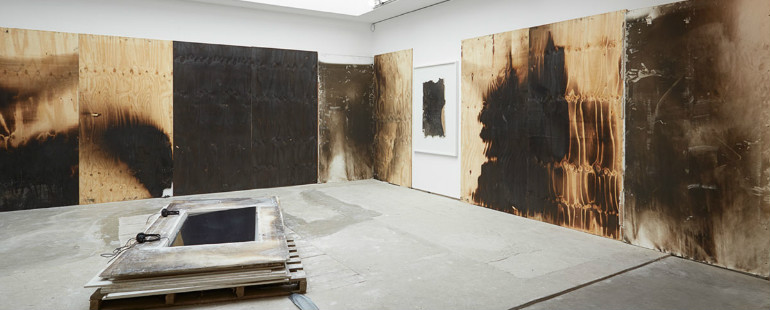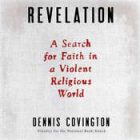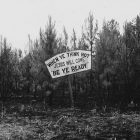With Late Capitalism Hovering in the Background: In Conversation with Wendy Xu and Jesse Hlebo

In a blog series for Ploughshares, I interview a poet and a non-poet. This time, poet Wendy Xu and visual artist Jesse Hlebo discuss the ways that narratives are built—be they historical narratives, narratives of global conflict, or our own family narratives. What follows is an amalgam of these two conversations. While Wendy speaks about her experience growing up enmeshed in both Chinese and American cultures and the intersections of immigration, lineage, and voice, Jesse, whose work deals primarily with conflict, crisis, and police brutality, questions civilization altogether. He entertains the idea of total societal and environmental collapse, saying, “The ecological world is bucking right now.”
**
Wendy Xu: What was it—my dad’s—
Anaïs Duplan: Your dad’s poetry.
Wendy Xu: Let’s talk about my dad’s poetry. [laughs] Sure.
Wendy and I speak over the phone. We start our conversation talking about her father, who has begun writing poetry in recent years.
WX: He’s really interested in clarity and how to express himself ‘the best.’
AD: What’s your sense of what ‘the best’ means?
WX: I think that accessibility is actually really important to him. My dad doesn’t have training in poetry, but you don’t need training in poetry to know that there is something very special about, as he would put it, thinking deeply about a topic.
We talk about the question of making one’s work accessible to a readership that doesn’t share the poet’s cultural background:
WX: Accessibility, ultimately, is a question of audience. I’m not saying anything all that complicated, when I say that who you are accessible to is absolutely a matter of your experience and your audience’s experience. As somebody who writes frequently about my immigrant identity and about my narrative, which is not the dominant narrative, I think obsessively about the implications of quote unquote explaining or contextualizing too much or too little. It doesn’t feel unproductive for me to have to deal with these questions, I guess. And I wonder if you can relate to those sorts of considerations in your work?
AD: Oh certainly. I was just thinking about this labor that you mentioned, which feels like the labor of being, in a sense, comprehensible. A similar thing does enter into my work, though more around the question of syntax. My first language was French and French is not a language that I speak in any conscious way, but I do think it sort of presses on the way that I think about syntax.
We discover that both of us have encountered the dilemma of, in the process of composing a poem, searching for the right word and realizing that the right word may not be in English; and while it’s all well and good to include non-English words in one’s poetry, I say to Wendy, “there is no way to make that substitution in a way that is not in itself a gesture.”
WX: When I find myself translating because I know that my audience is an English-speaking audience, because I’m composing primarily in English, it does feel it’s an accommodation, And when I say it that way, it sounds negative but your phrasing— was it like, it’s a gesture, is that right?
AD: Yeah.
WX: I like that a lot. I mean, because it is work, right? You do go out of your way to gesture and you certainly go out of your way to accommodate, but it’s in the service of bringing a reader into an understanding with you.
Throughout my interview with Wendy, we attempt to find sites of shared understanding between reader and writer, a kind of truth-making process. In my interview with Jesse, however, he emphasizes the subjective, individual aspects of this truth building. We start by talking about the nature of the interview.
Jesse Hlebo: Anytime something is made public you’re constructing your own narrative, right? There’s a difference between having a conversation with somebody and then what you’re releasing to the world in a different way. Because essentially anything that exists in regards to press, more so than social media, becomes a historical document.
He continues—
JH: So much of my work has to do with—or just my headspace in general has to do with—the notion of truth. And that there is no one truth or one good or bad. There’s a lot of choose-your-own-adventure. I think a lot about how you can make your own history. In the society that we exist in currently, you’re able to; and perhaps throughout all of civilization, you’re able to make your own history. You can erase parts of your existence and put in new parts of your existence.
Later, he says, “We exist in a time right now where media is both creating and documenting the crisis that’s happening around us.” In other words, the media—social and otherwise—has a constructed relationship to global conflict and constructs this relationship by acting as the ‘voice’ of conflict. The voice of the media speaks to and from conflict.” The question of voice, and its relationship to narrative-building, comes up for Wendy as well:
WX: When I think about voice, too, I think about my aunts and my uncles and my grandparents. Their actual voices will literally never enter literature. If I don’t do it, if I choose not to record their voices, they just won’t end up in history, in recorded history. But then I’m, of course, lacking in the ability to experience firsthand these things that happened to my parents or to my other relatives. And so when I represent them, when I give them voice in my writing, it is also—it’s a performance. I am manufacturing some of it, and I’m trying to make it an emotionally true voice, but it is, of course, also me. There’s an enormous act of translation and, of course, something is being lost there. I’m representing them in an English-speaking text [to] an English-speaking audience and, unless someone translates it back into Chinese down the line, it also won’t enter the written cannon of the language that they speak.
AD: Speaking more generally about poetry and its very tenuous relationship to the market, how much of the conversation around accessibility is tied also to an indebtedness to a consumer?
WX: It is very complicated that we, also, as poets, we do this every day. We buy and we sell poetry. I’m just sort of thinking this through as I’m talking about it, so I guess I want to ask you because I’m not so sure how I feel yet. Does it ever enter your mind that the poems—or when you were writing Take This Stallion—that those poems would go into a book and people would give you or your press real money for those poems? Do you ever remember thinking about actual money?
AD: In writing Take This Stallion, no. Not at all. [But] a lot of what I am doing now, as far as writing, has to do with writing through what feels like, in my case, my own overwhelming awareness of the fact of buying and selling poetry.
Wendy then summarizes my anxiety:
WX: We live in a late-capitalist situation where if something is not worth money then culture says it’s not worth anything at all.
With late capitalism hovering in the background, Jesse, too, offers a way to understand the current cultural climate:
JH: On one hand, it can be difficult to tell whether it is intensifying, but the appearance of something intensifying then has the effect of actually intensifying something. I mean, you have things like very warm winds and carbons populating the Antarctic that [are] causing seas to rise, which is then killing organisms, small plankton and whatnot, that, up the food chain, end up [affecting] other fish, which then affects food supplies for humans, which then has an economical effect, which then ends up contributing to political confrontations that then occupy not only a militaristic space but a social space.
Resources are something that, for a long time this past century, had been a major focal point of the wars that have been fought or continue to be fought. While concurrently, having rises in polarities between social ideologies, like rises in nationalism worldwide, that is also affecting and being affected by mass migrations due to these wars. It’s like a feedback loop. All these things informing one another. . . . Anything you do in civilization is going to be destructive or it’s going to displace or negatively affect something else. Practically everything you do. I guess you could fall in love with someone and that doesn’t displace something, necessarily [laughs].
**
Photo: Jesse Hlebo‘s 2015 installation In Pieces at Edel Assanti in London
These interviews have been edited and condensed.



